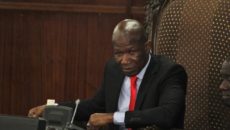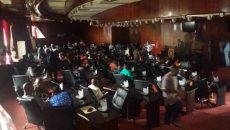HARBEL Margibi – As citizens across Liberia have been discussing reforming key electoral laws and policies, some voters in Margibi are debating whether basic educational requirements are necessary for representatives and senators.
Many Margibi voters interviewed separately believe that their lawmakers will better perform their duties if they are better educated.
“The legislature is just not a place people go, ride luxurious cars, and pocket a lot of money at the expense of the suffering masses,†said Daniel Samah, a resident of Unification City.
Samah said lawmakers who lack formal education tend to contribute little during key discussions during the campaign season. Yet, he said some of these people end up being elected by voters who say they are desperately yearning for change.
Fredrick Varnie is another Margibi resident who also supports educational qualifications for candidates. He predicted that a clause that established a certain educational baseline would ensure that lawmakers have a minimum capacity to critique and analyze legislation, leading to them to pass better laws.
He said, too often, uneducated lawmakers are “mute while discussions are ongoing at the legislature.â€
More prospective lawmakers would begin to prepare themselves to contribute to national development, he said. Varnie further noted that the addition of such provisions in the law would improve the prestige and respectability of the legislature and it could allow adequate participation of lawmakers since they would all have the capacity to contribute.
Francis Kamara, a 37-year-old resident of Cotton Tree, expressed disappointment at voters who like to vote for lawmakers who lack formal education.
“Voting informal lawmakers in power is like when a person has a big sore on his feet and digs in it with a sharp object, so it gets healed,†he added.
“Most of the problems we face in this country can be attributed to the decisions we make during elections. We need serious and educated legislators to develop this country.â€
However, not all Margibi voters want a formal education restriction in place. Mark T. Nuah, who works in the office of Margibi’s Sen. Jim Womgbe Tornonlah, wants the law on the book to remain as it is in relation to the educational qualifications of representatives and senators.
“While it is true that the legislature needs educated and competent individuals, if the people see it expedient to vote for an uneducated candidate, so be it,†he explained his point of view.
Nuah said the issue of who becomes a representative or senator should squarely lie in the hand of the people. They can choose who they want and feel is best suited to represent them.
“I think enshrining educational requirements in the electoral law will be seen as an infringement on the rights of others who are not well educated or have basic education,†he added.
“Mind you, you are aware that we live in a society where majority of the people are gullible. Any attempt to do such, there might be a strong resistance.â€
Paul Yarkpasuah took the argument even further: “Most of the ugly legislations affecting our people in this country are a result of the educated people. They have failed to use their education to benefit the people they represent.â€
Yarkpasuah said some lawmakers lacking formal education have done well to improve the lives of their people.
“It is not about speaking big English or wearing expensive coat suits. It is about using your education to transform the lives of your people,†he added. Yarkpasuah declined to name formally educated lawmakers who he considered corrupt.
The constitution sets four requirements for members of the Senate: they must possess Liberian citizenship, must be at least 30 years old, must have been domiciled in the county which they represent for at least one year prior to the election, and must be a taxpayer. The only difference in the eligibility requirements for a representative is that the minimum age is lowered to 25 years old.
This article was produced with funding from Internews for the Citizens in Liberia Engaged to Advance Electoral Reform (CLEAR) project.
Featured photo by Zeze Ballah



